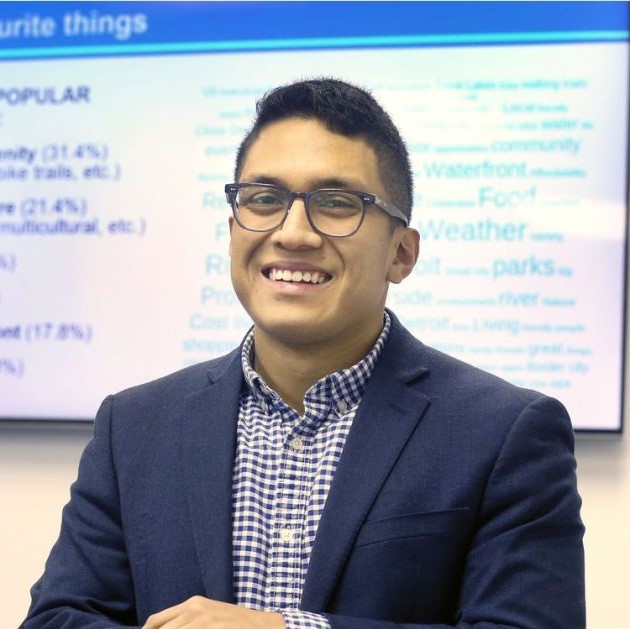
| Resource Specialization | Urban Sustainability |
| Region Specialization | Asia-Pacific |
| Hometown | Windsor, Ontario, Canada,Windsor, Ontario, Canada |
WHY DID YOU CHOOSE THE RESOURCE/REGION SPECIALIZATIONS THAT YOU DID?
’ve always been fascinated by cities and drawn by the type of work that urban planners and policy professionals do. Urban environments are also an imperative piece of addressing some of the biggest issues that our global society is facing this century. With that in mind, I wanted to make urban environments central to my GRS journey, and to learn how global priorities can be met through actions at the local scale in cities. Focusing my academic and professional career on urban environments means that I can usefully foster a diversity of skills (data analysis, consensus building, strategy development), always have the big picture in mind, and think creatively.
WHAT ARE YOUR MAIN RESPONSIBILITIES IN YOUR POSITION?
Workforce WindsorEssex is an organization that spearheads workforce and community development initiatives in the region of Windsor, Ontario (my hometown). As a Project Coordinator and Researcher, my job is to investigate specific social or economic issues in the community, and to develop resources that improve how people make decisions around the labour market, whether they are policymakers, educators, students, or members of the workforce.
The labour market is one of those topics that is inextricably linked with the urban environment. Housing, transportation, and even urban design play really important roles in things like attracting and retaining the skilled workforce (including newcomers to Canada), and promoting the healthy and equitable integration of groups who have been systemically excluded from employment. I always find myself returning to topics of urban sustainability in my research and my reports, and as a result, I’m increasingly working with people who are creating and advocating for improvements in the urban environment in Windsor, including urban planners, community activists, property developers, and business associations. Like the GRS program, my current job is one where I can explore a diversity of topics and meet people with a diversity of professional and cultural backgrounds who approach the world in different ways.
HOW DID GRS PROGRAM PREPARE YOU FOR THIS ROLE?
The overlap between a GRS education and the requirements of economic and community development work is very strong. One requirement is a big picture view of complex issues that appreciates a diversity of social, economic, and environmental components and how they interact. The GRS program offered many opportunities to practice applying a systems-level view of issues, especially through the Land, Food and Community courses. Those courses were also a great opportunity to develop effective skills and a high level of comfort for working with others and with “stakeholders,” which is also central to the work I do now. Through my experience in GRS, I also had the opportunity to develop research skills that I use on a daily basis, including developing surveys, conducting statistical analyses, and using GIS software.